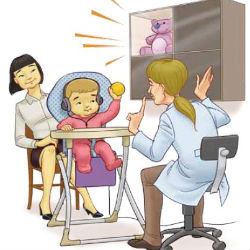
Your child’s hearing
28 February 2024
It is never too early to test your child’s hearing if you think that there is a problem. Between one and six out of 1,000 newborns are born deaf and one in 10 children will develop a hearing problem sometime during childhood.
There are numerous causes of hearing loss in infancy, for example, a family history of hearing problems, low birth weight or ear infections.
By identifying hearing-impaired children at a very young age, health professionals can help families more quickly to ensure their children can communicate well with other people.
The critical period for learning language is before a child’s second birthday.
To learn a language children need to hear properly, so parents should be concerned if their child’s language development is late.
Normal reactions of children at different ages
At four months, your child should:
- move or react when someone speaks or when there is any kind of noise
- react when there is a very loud noise
Suggestions to help in your child’s development:
- talk to your child, sing, call him by name
- give your child toys that make sounds
- entertain your child by making different sounds with your mouth and imitating the sounds he makes
At seven months, your child should:
- turn his head when there’s a noise or when you call even if he can’t see you
- stir or move when he hears a noise or someone’s voice
Suggestions to help in your child’s development:
- talk, sing and play with him
At nine months, your child should:
- turn his head to find out where a sound is coming from
- turn around if you are calling from behind
- stir or move when he hears a sound or someone’s voice
Suggestions to help in your child’s development:
- praise your child often
- whisper words your child knows in his ear to get a reaction
- repeat the sounds your child makes so that he will imitate them back to you
- talk to your child about his toys and things around the house
- draw his attention to the different sounds in the house
- read books together
At 12 months, your child should:
- turn his head in all directions and show an interest in a person’s voice or a particular sound
- repeat the sounds that you make
Suggestions to help in your child’s development:
- show your child parts of the body, and point to them with your finger
- show him books with colour pictures and show him how to turn the pages
- play with your child and ask him questions
At two years old, your child should:
- be able to point to a part of his body when you ask, without seeing your face
- be able to point to the right picture when you ask
- be able to do something simple like giving you one of his toys when you ask, without seeing your face
Suggestions to help in your child’s development:
- read books with your child, ask questions, and have him point to pictures
- ask him to do small tasks like putting a toy on the table
- talk to your child about everything around you and everything he can see
(Source: The Canadian Hearing Society)
